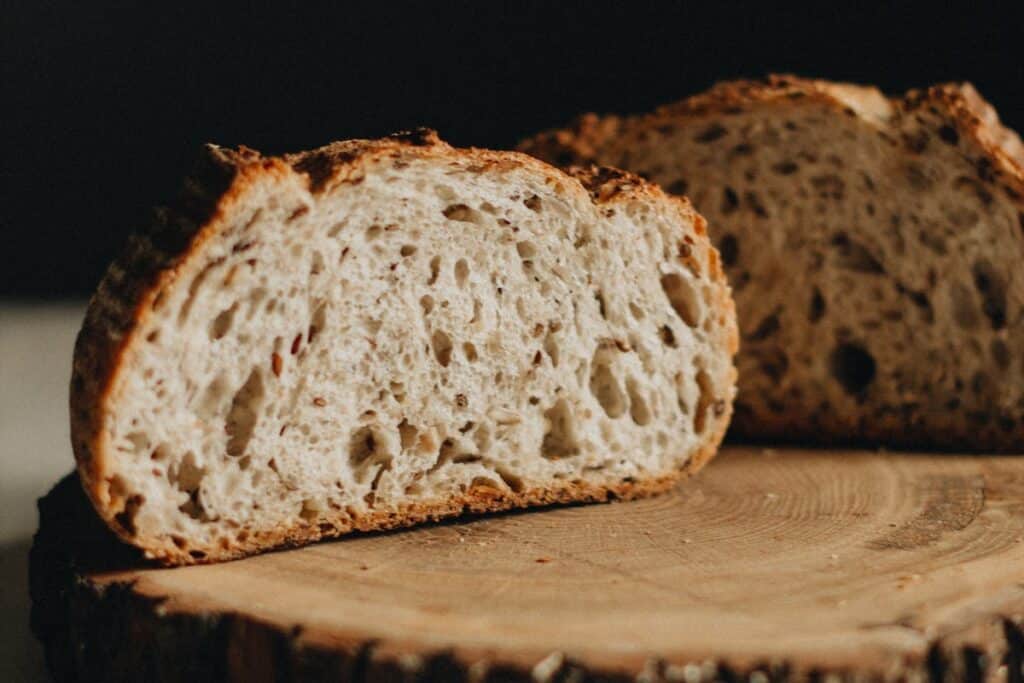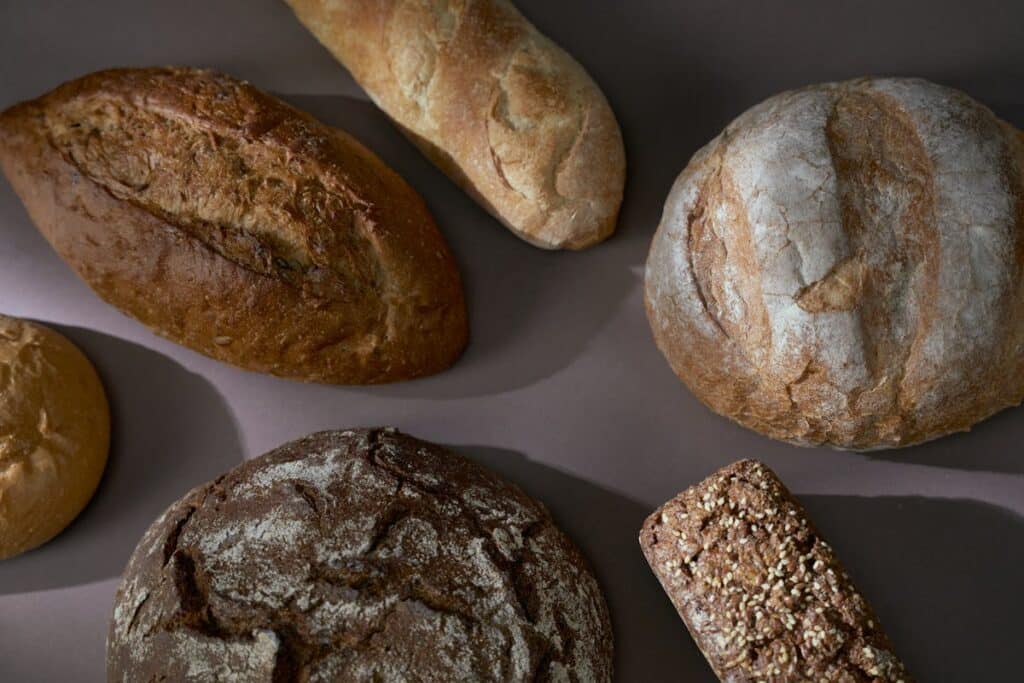
If you think you can’t enjoy bread while trying to lose weight, don’t worry—there’s bread for almost every diet! For instance, sourdough bread is relatively low in carbs, usually containing about 10 grams per slice—half the carbs of typical white bread. This makes it a great option if you’re trying to lose weight or follow a keto diet. Keep reading to learn more about how sourdough bread can fit into your weight loss plans.
In this article
[Related: Fat Loss Secrets from 24 Leading Experts]
Sourdough Bread’s Nutritional Profile
On the surface, sourdough bread doesn’t look too different from other bread types. It contains wheat flour, water, salt, and a live fermented culture instead of commercial yeast. It’s this last ingredient that makes sourdough unique and more beneficial than most breads.
The fermenting process pre-digests the flour, reducing the need for your body to do all the work. The result? Easier digestion and absorption.
Here’s the nutritional breakdown for one slice of sourdough bread based on USDA data:
- Calories: 84
- Carbohydrates: 16 grams
- Fiber: 1 gram
- Added Sugars: 0 grams
- Protein: 3 grams
- Total Fat: 1 gram
- Saturated Fat: 0 grams
- Sodium: 187 mg
Can You Include Sourdough Bread in A Weight Loss Diet?
Although sourdough typically has fewer calories and carbohydrates than other breads it’s still relatively high in carbohydrates compared to foods like vegetables. But because the fermentation process consumes some of the starches and sugars, it doesn’t cause rapid spikes in blood sugar levels.
This is crucial if you’re trying to lose weight, as avoiding these spikes can reduce sudden hunger and overeating.
Tip: When choosing sourdough bread, choose the ones made with whole wheat, spelt, or rye. Studies suggest that Einkorn wheat, an “ancient grain,” could offer extra nutritional benefits. Also, when reviewing nutrition labels, prioritize breads that have fewer ingredients and are lower in sodium and sugar.
How Sourdough Bread Supports Blood Sugar Control
A study involving overweight adult men revealed that sourdough and whole-grain breads help control blood sugar better than regular commercial breads. Sourdough was particularly effective, helping to keep blood sugar levels steady even after eating it. This is largely due to its lower glycemic index, which causes a slower, steadier rise and fall in blood sugar.
This gradual change can help maintain balanced energy levels throughout the day and reduce the likelihood of experiencing sugar crashes, which often trigger cravings for quick energy boosts and can result in unhealthy snacking habits.
How Sourdough Bread Makes You Feel Fuller
Did you know that when your stomach sends satiety signals to your brain, you’re less likely to overeat? Sourdough bread is known for encouraging satiety, thanks to its higher fiber content and the slow-releasing energy from its complex carbs. This can help you feel full longer for a longer period after meals.

An unhealthy gut can significantly impact weight loss efforts due to its crucial roles in digestion, metabolism, and hormone regulation. A well-balanced gut flora aids in the effective digestion and absorption of nutrients, optimizes metabolism, and ensures proper hormonal balance that controls appetite and fat storage.
One way to support gut health is by choosing foods rich in prebiotic fibers, such as sourdough bread. Unlike conventional breads, sourdough is particularly abundant in prebiotic fibers, which act as nourishment for beneficial gut bacteria. By incorporating sourdough bread into your diet, you can help maintain a healthy gut flora, which is a fundamental step towards enhancing metabolic health and supporting weight loss efforts.
Can You Eat Sourdough Bread Every Day?
Here’s some good news: carbohydrates account for about 50% of our daily energy intake, so eating sourdough every day is fine. However, maintaining a healthy diet means eating a variety of foods to meet all your nutritional needs.
Our gut microbiome benefits from a varied diet, so if you enjoy sourdough, think about mixing up your toppings (such as peanut butter, tahini and banana, or ricotta and strawberries) or experimenting with different types of sourdough like rye and wheat or seeded varieties. This variety can help you get different nutrients from your food.
What to Consider
Let’s not sugar-coat things. Sourdough bread is still bread. It’s relatively high in carbs and can pack a caloric punch if portions are uncontrolled. Those with certain dietary restrictions or food sensitivities, like Celiac disease or gluten intolerance, should still avoid sourdough. So while it’s a step up from regular breads, moderation is still key.
The bottom line? Not all sourdough bread is created equal! When incorporating sourdough into your diet, choose whole grain options and avoid those packed with extra sugars or lower quality ingredients. Combining sourdough with a balanced, nutrient-dense diet and regular physical activity will yield the best results.
Frequently Asked Questions (FAQs)
Got more questions about sourdough bread for weight loss? Check out some commonly asked questions below:
Which bread is best for weight loss?
Whole-grain breads, like whole wheat or whole rye, are generally recommended for weight loss because they contain high levels of fiber, which can help you feel full longer and manage hunger. Sourdough bread can also be a good option due to its lower glycemic index, which helps prevent blood sugar spikes that can lead to increased appetite.
Is sourdough the lowest-calorie bread?
No, sourdough is not the lowest calorie bread. While it generally has fewer calories than many other types of white or commercial breads, breads like thin whole grain or certain reduced-calorie options might have fewer calories per slice.
How many calories are in 2 slices of sourdough bread?
The calorie content can vary depending on the specific recipe and size of the slice, but on average, 2 slices of sourdough bread contain about 280 calories. This is based on an average of 140 calories per slice.
How many slices of sourdough bread can you eat on a keto diet?
Sourdough bread is typically higher in carbs, which can make it challenging to fit into a strict keto diet that limits daily carb intake to about 20 to 50 grams. One slice of sourdough can contain around 16 to 20 grams of carbohydrates, so if you choose to include it, you might only be able to have one small slice a day without exceeding carb limits. However, most people on a keto diet might prefer to avoid it to maintain ketosis.
Bottomline
Sourdough bread isn’t a magic bullet for weight loss. Instead, it’s a potentially useful tool in your nutritional arsenal, offering a healthier alternative to many commercial breads, easing digestion, stabilizing blood sugar levels, and promoting satiety. Distinguishing fact from fad in our daily diets means more informed choices and ultimately, better health outcomes. Always eat smart!
Key takeaways
- Sourdough bread is easier to digest and absorb due to its fermentation process. A slice typically contains 84 calories, 16 grams of carbohydrates, and 3 grams of protein.
- It has a lower glycemic index than other breads, leading to steadier blood sugar levels and fewer cravings.
- The fiber and complex carbs in sourdough increase feelings of fullness, helping to control hunger and prevent overeating.
- Although beneficial, sourdough is still high in carbs and calories, and not suitable for those with gluten sensitivities.
- For optimal health benefits, choose whole grain sourdough without added sugars and combine it with a balanced diet and regular exercise.
